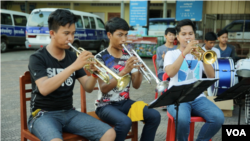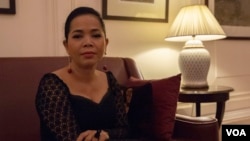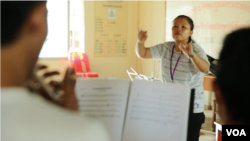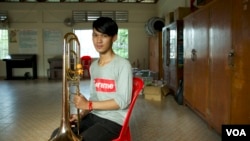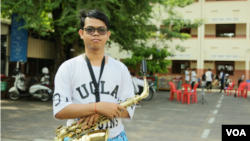PHNOM PENH – On most days, the courtyard of Kolab Primary School is a cacophony of children at play, but on Sunday afternoons, the humid air rings with the cheery din of Phnom Penh’s only independent marching band.
On a recent Sunday, the band’s 25 members were seated on red plastic chairs or standing in the shade of a tamarind tree, rehearsing a decidedly non-traditional tune: John Williams’ “Star Wars” theme.
The cosmic composition proved challenging for the young musicians, but by breaking into small groups of like instruments, they began to work out the kinks, joking good naturedly about mishaps and missed notes.
“When the kids are busy with the band, they forget about teenagers’ troubles: drugs, loitering, wasting time and so on.”
After reconvening, they got on beat and in tune, and started to sound like any one of the thousands of brass bands tromping across sports stadiums in the US, save for one key difference: the Phnom Penh Marching Band doesn’t do much marching — being unable to afford a marching coach.
“We don’t have an instructor, we have very minimal equipment…and when we are invited to join international conferences, we can’t go because we can’t afford the kids’ passports and accommodation,” said Him Savy, a professional flautist and co-founder of the band.
The Price of Success
The Phnom Penh Marching Band has its roots in the Tokyo-based NGO Japan Team of Young Human Power (JHP), which sponsored music education programs across Cambodia in the early 2000s. When JHP’s funding was cut in 2013, the group provided instruments to several of its Cambodian staffers, including Him Savy, who formed the band the following year.
Since then, membership has fallen from 35 to 25 due to scheduling conflicts and the cost of commuting to practice. But the remaining members — mostly amateur musicians in their late teens and early 20s — are more determined than ever to prove that brass bands have a place in contemporary Cambodian culture.
“When JHP cut their sponsorship, they asked me to keep supporting the kids,” Savy told VOA during a break from one of her daily performances in the lobby of the Sofitel hotel.
“I sympathized with these young people who have spent so much time and energy training,” she added. “They have both the skills and motivation.”
And while JHP still supplies the instruments, the band relies on the income from paid performances – between two and five in a good month – to cover basic operating costs such as transportation to the provinces. The musicians pocket $10 to $20 per performance.
“Performing with the band allows these kids to earn some money and reduce the burden on their parents, who are struggling with poverty,” Savy said. “When the kids are busy with the band, they forget about teenagers’ troubles: drugs, loitering, wasting time and so on.”
The band has garnered some recognition, having played at events for the Royal University of Fine Arts, the French Institute, the Australian Center for Education, and international brands Panasonic and KFC.
“After a while” she added, “these kids start to dream of taking music to another level, as their profession.”
Teen Spirit
But despite the dedication of its members — and trickle of extra income — the band’s weekly three-hour practices aren’t popular among parents.
Even Phon Chanleakhena, the band’s leader and a senior at the Royal University of Fine Arts (RUFA), had to convince her family of the merit of the band’s practices on Sunday afternoons — sacred family time.
“They didn’t want me walking around, playing instruments and earning money like that. They wanted me to stop,” she said.
But Chanleakhena persisted, emboldened by a once-in-a-lifetime experience: playing for King Norodom Sihamoni alongside members of the US Air Force Band in 2016.
“I have spent so much time with the saxophone and there is still so much I want to learn about it.”
Now 21, Chanleakhena leads the tough practices, encouraging more experienced musicians to tutor the novices. In the absence of a professional instructor, this peer teaching is the only way to raise the group’s collective skill level.
“It’s really fun,” she said of the rehearsals, “but also very tiring because I have to shout over the loud instruments.”
Ut Vicheka, a 19-year-old student at Indradevi High School and one of the band’s three trumpet players, had a different experience dealing over his parents.
“My parents pushed me to play music because they didn’t want me to waste my time doing useless things,” he said. “But somehow I became too addicted, and they kind of wanted me to stop.”
Vicheka caught the music bug six years ago while playing the pianica in the school’s Red Cross-sponsored marching band. He eventually swapped the pianica for a trumpet and became one of the band’s best players. A JHP staffer noticed him and encouraged him to audition for the Phnom Penh Marching Band.
He failed. Despite his natural skill, Vicheka didn’t know how to read music, and his technique was not up the band’s standards. Two months later, however, he received a call from the same staffer, who asked if he still wanted to join the band. He was in.
Western-style brass bands are a relatively new phenomenon in Cambodia, most of them formed through schools and Scout troops, and members of the Phnom Penh Marching Band have to be self-motivated if they want to excel.
After the first hour of each practice, the musicians are granted a 20-minute break. Most scatter, but the youngest stick around to learn theory and note reading.
Trombonist Om Daro, a 21-year-old RUFA freshman who joined the band four years ago after playing in a Scout troop ensemble through high school, was once one of them.
“There were times when we needed to hit hard notes and I couldn’t do it, and it made me feel really bad. I only knew how to play; I didn’t know how to read music,” he said. “But I believed that if other people could do it, so could I.”
Now a proficient note reader, Daro tutors not only his fellow trombonists, but also students the French Institute.
“We keep the band together in order to teach the kids what work is, what responsibility is, and the hardship one has to endure in order to become musician.”
Saxophonist Otdom Praseth, however, has only himself to rely on, but feels a profound sense of duty to his bandmates.
“Because I am the only one who plays the saxophone, I will not leave. I want to support my band,” said Praseth, a graphic designer for the media company Town Production.
“I love this instrument,” he said. “I have spent so much time with the saxophone and there is still so much I want to learn about it.”
But despite the challenges facing the band — financial, familial — its members are determined to make a name for themselves, at home and abroad. Without a marching coach, the band is focusing foremost on the music, but hopes to one day perform overseas.
“I am very happy about what we have done,” said Savy, the flautist.
“Despite my super busy schedule, I keep going, because I really care about my students and I don’t want to see marching bands disappear from Cambodia,” she said.
“We keep the band together in order to teach the kids what work is, what responsibility is, and the hardship one has to endure in order to become musician.”




